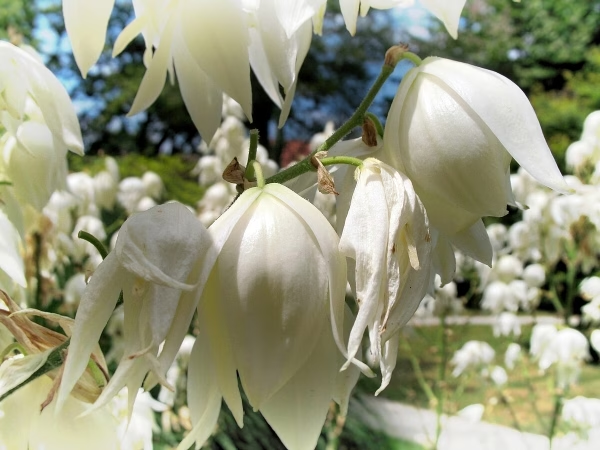
Adam’s Needle/Yucca
Botanical Name
:
Yucca filamentosa
Plant Type
:
Evergreen shrub
Seasons
:
Year-round, flowers in late spring or early summer
Sun Level
:
Full Sun to Partial Shade (at least 6 hours per day)
Ideal Soil Temperature for Planting
:
65–75°F (18–24°C); Warm enough for active root growth, but not excessively hot
Soil Type
:
Well-drained, sandy, loamy, or chalky
Hardiness Zones
:
5–10 (USDA)
Germination
:
4–6 weeks
P.H. Level
:
Slightly acidic to neutral (6.0–7.0)
Water/Irrigation
:
Water occasionally during the first year to establish roots. Drought-tolerant once established
Fertilization
:
Not necessary but a light application of a balanced fertilizer in spring can benefit poor soils
Habit
:
Forms a rosette of rigid, sword-shaped leaves with a tall flowering stalk
Propagation
:
Seeds, cuttings, and divisions
Final Plant Height
:
3–8ft
Spread
:
2–3 ft
Flowers
:
Tall, erect flower stalk with drooping, bell-shaped white flowers
Attracts
:
Moths (specifically Yucca moths, which have a symbiotic relationship with Yuccas), hummingbirds
Uses
:
Ornamental landscaping, xeriscaping, rock gardens
Companions
:
Coneflowers, black-eyed Susans, prairie grasses, blanket flowers
Pruning
:
Remove dead leaves or spent flower stalks as needed. Generally low-maintenance
Toxicity
:
Non-toxic to humans but mildly toxic to pets if ingested
Pests
:
Yucca plant bugs, scale insects, and mealybugs
Diseases
:
Root rot if overwatered, occasional fungal leaf spots
Additional Info
:
The yucca moth (Tegeticula yuccasella) has a unique symbiotic relationship with the plant—it is both its primary pollinator and dependent on it for reproduction
Botanical Name
:
Yucca filamentosa
Plant Type
:
Evergreen shrub
Seasons
:
Year-round, flowers in late spring or early summer
Sun Level
:
Full Sun to Partial Shade (at least 6 hours per day)
Ideal Soil Temperature for Planting
:
65–75°F (18–24°C); Warm enough for active root growth, but not excessively hot
Soil Type
:
Well-drained, sandy, loamy, or chalky
Hardiness Zones
:
5–10 (USDA)
Germination
:
4–6 weeks
P.H. Level
:
Slightly acidic to neutral (6.0–7.0)
Water/Irrigation
:
Water occasionally during the first year to establish roots. Drought-tolerant once established
Fertilization
:
Not necessary but a light application of a balanced fertilizer in spring can benefit poor soils
Habit
:
Forms a rosette of rigid, sword-shaped leaves with a tall flowering stalk
Propagation
:
Seeds, cuttings, and divisions
Final Plant Height
:
3–8ft
Spread
:
2–3 ft
Flowers
:
Tall, erect flower stalk with drooping, bell-shaped white flowers
Attracts
:
Moths (specifically Yucca moths, which have a symbiotic relationship with Yuccas), hummingbirds
Uses
:
Ornamental landscaping, xeriscaping, rock gardens
Companions
:
Coneflowers, black-eyed Susans, prairie grasses, blanket flowers
Pruning
:
Remove dead leaves or spent flower stalks as needed. Generally low-maintenance
Toxicity
:
Non-toxic to humans but mildly toxic to pets if ingested
Pests
:
Yucca plant bugs, scale insects, and mealybugs
Diseases
:
Root rot if overwatered, occasional fungal leaf spots
Additional Info
:
The yucca moth (Tegeticula yuccasella) has a unique symbiotic relationship with the plant—it is both its primary pollinator and dependent on it for reproduction
Written by Nondiah Khalayi – https://www.linkedin.com/in/nondiah-khalayi/

